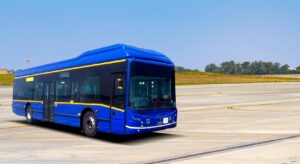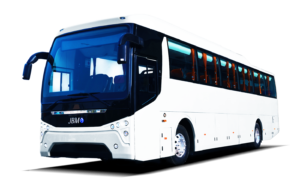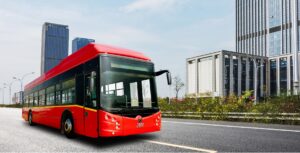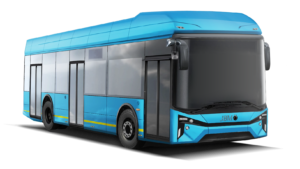In an exclusive interview with Bus Coach India Magazine, JBM Auto, Vice Chairman & MD, Mr. Nishant Arya, said that the JBM Auto stands firmly committed to India’s e-mobility revolution. JBM Auto envisions a future defined by smart, connected, autonomous, and shared mobility solutions. Clean mobility is the guiding principle for the company, and we understand that the creation of a comprehensive electric mobility ecosystem is critical to driving wider EV adoption.
Q: How do you see the potential of the electric bus industry in Indian market? What is the growth plan for the JBM?
A: The transport sector is the third highest CO2 emitting sector in India, with road transport accounting for more than 90% of these emissions. Buses are the backbone of Indian public mobility. There are about 1.6 million registered buses in India, operated both by private and public operators. Of these, around one-third each is comprised of city buses (both government and private), intercity & coaches, and school & staff buses respectively. These buses consume substantial amounts of oil and cause emissions. Electrification is an important objective for both energy security and climate change objectives. India is a frontrunner when it comes to transitioning to electric vehicles especially in the electric bus domains, thanks to the forward-looking policies of the government, etc. The EV sector in India has taken significant strides towards creating an extensive charging infrastructure network, effective payment security mechanism, power infra, etc. which has led to a faster deployment of electric buses in the country. India’s rapid urbanisation and environmental challenges demand a modernised mass transit system. Electric buses offer a vital solution for reduced emissions and improved urban health. Backed by government policies and technological advances, JBM is ready to lead this transformation, essential for India to meet its net zero emissions target by 2070. Currently, JBM Auto has a robust order book of over 6,500 electric buses deployed and under execution. We have also recently setup the world’s largest dedicated integrated electric bus manufacturing facility (outside China), covering 4 million square feet in Delhi-NCR, with an annual capacity to manufacture 20,000 buses.

Q: Would you like to shed light on the current scenario of Luxury bus in domestic and overseas markets?
A: This segment presents significant potential for growth, with substantial demand for luxury buses from both State Transport Undertakings and private bus operators. At the last Auto Expo, we unveiled our luxury electric coach ‘Galaxy,’ which has garnered an exceptional response from our customers. Moreover, we have developed products for the international markets. We have carried our product trials across multiple geographies in Europe, Middle East, Asia Pacific with renowned bus operators. These test drives have highlighted the adaptability of JBM e-buses to varying road conditions, climates and operational patterns. The success of these test trials have established JBM Electric Buses a viable solution for public transportation worldwide.
Q: How much has JBM invested during the last financial year and what are your plans for the next FY 2025? What was the capex requirement for new products in the alternative fuel or electric segment?
A: We are consistently enhancing our capabilities across multiple dimensions, with a strong emphasis on innovation in technology, safety, efficiency, and product design. In the previous fiscal year, we established the world’s largest electric bus manufacturing plant in Haryana, in alignment with the ‘Make in India’ initiative, to support the expanding electric bus sector. Our commitment to investing in technology, research and development, and battery manufacturing capacity will continue to align with the sector’s evolving demands. Our advanced lithium-ion battery manufacturing facility in Delhi-NCR boasts an annual capacity of 3 GWh, with plans to expand to 5 GWh this year. These facilities have been recognized by the Department of Scientific and Industrial Research, Ministry of Science & Technology, Govt. of India, for their robust in-house R&D infrastructure and capabilities. We remain committed to investing in research and development to further enhance our capabilities and drive innovation.

Q: According to you, what are trends that is dominating the Indian Bus & Coach industry?
A: The electric vehicle (EV) ecosystem is rapidly evolving, driven by technological advancements, policy support, and increasing consumer interest. Some of the latest trends in the growth of the EV ecosystem include battery technology innovations involving second and third life applications, charging hubs and their integration with renewable energy, Vehicle-to-Grid (V2G) technology, integration with autonomous driving being seen as the future of mobility, sustainability in manufacturing, etc. These trends indicate a robust and dynamic evolution of the EV ecosystem, which is expected to continue accelerating as technology advances and global demand for sustainable transportation solutions grows.
Q: What are the new technologies that JBM is readying towards commercialisation?
A: JBM Auto is seamlessly integrating Industry 4.0, data analytics, IoT, artificial intelligence, and machine learning across our operations. Real-time data and analytics enable predictive decision-making, optimising vehicle health, battery management, and overall performance. JBM Auto’s 10 comprehensive pillars of excellence related technology, total cost of ownership, performance, manufacturing, and global deployment, to name some, are helping us create world-class products and solutions. We continue to invest in future technologies and conduct deep research and development across various manufacturing practices and products and shall share the outcomes at an appropriate time in the future.
Q: How do you see the future of hydrogen Bus technology, and do you have any plan to work on it?
A: The industry is working towards developing multiple alternate fuel mobility solutions that will drive the clean mobility narrative of the future. Hydrogen buses are not just a concept for the future, they are a viable and rapidly developing technology today. As innovations continue and infrastructure expands, we believe hydrogen buses will play a crucial role in the global transition to sustainable and low-emission public transportation.
Q: What is the vision and targets that you have set for yourself to develop the market for JBM in India and project it as a strong, modern, consistent and reliable brand in the market?
A: JBM Auto stands firmly committed to India’s e-mobility revolution. JBM Auto envisions a future defined by smart, connected, autonomous, and shared mobility solutions. Clean mobility is the guiding principle for the company, and we understand that the creation of a comprehensive electric mobility ecosystem is critical to driving wider EV adoption. JBM Auto’s modern and technologically superior e-buses are redefining public transport across India. By setting new benchmarks in passenger comfort, safety, affordability and innovation, JBM Auto’s e-buses will eventually make public transport the preferred choice for commuters over personal vehicles. This shift will contribute to a more sustainable and efficient transportation system.

Q: What differentiates JBM from its competitor brands and makes it stand tall within its target markets?
A: At JBM Auto, sustainable transport goes beyond decarbonisation; it’s about meeting societal needs throughout the transport ecosystem. As a leading force in the shift towards electrification, JBM is expanding its range of zero-emission electric buses, suitable for various applications in cities worldwide. The offerings include 9 Platforms with 16 variants of electric buses with numerous applications. The Company is also planning new products & variants for government and private tenders, and expanding into international markets like the Middle East, Africa & Asia Pacific. We are India’s first OEM to showcase buses on multiple global platforms. We launched our Global LHD City bus and an ultra-luxury LHD Coach at Bus World, Brussels in Belgium, UITP Transport Exhibition in Dubai, Bus2Bus in Berlin, etc. JBM is currently the market leader in tarmac buses for the aviation sector with over 90% of market share. We are the only player with complete luxury electric bus range i.e. Luxury Airport Coach, Tarmac Coach, Luxury Intercity Coach amongst other products.
JBM Auto provides the best in class and seamlessly integrated EV platform – JBM E-Verse spread across the country that offers optimum total cost of ownership and maximum performance across various applications and geographies. The platform business provides Electric Mobility-as-a-Service (eMaas) in B2G and B2B domains.
Q: Which sectors do you think are going to contribute more to the industry? As a player as, what prospects do you see for Atmanirbhar Bharat to push automobile sector growth in this country?
A: The Indian automotive industry witnessed impressive growth in FY24. Total vehicle production increased to 28.43 million million units, a significant jump of 9.6% over the previous year. Domestic passenger vehicle sales also witnessed a 8.45% growth, climbing to 42.19 million units. As far as EVs are concerned, cumulative EV sales in India reached 41,35,077 units by the end of FY24. Annual EV sales crossed 1.7 million vehicles in FY24, with registered electric two-wheelers making up more than 55% of the sales, followed by passenger electric three-wheelers, which contributed ~32% to the overall sales. On an annual basis, e-bus sales witnessed a jump of 84% in FY24 over that in FY23. Projections indicate that the Indian EV market, valued at $ 2 billion in 2023, could surge to $ 7.09 billion by 2025. Industry estimates also forecast the domestic EV market to achieve 10 million annual sales by 2030, with strong support from the government. The Government of India has implemented various supportive policies to support automotive industry in general, and EV industry in particular. The FAME schemes, the Production Linked Incentive (PLI) scheme, road tax exemptions, and reduced GST are some of the government initiatives that have encouraged the growth automotive sector along with the EV sector. In the recent Interim Union Budget 2024-25, the Union Finance Minister once again laid strong emphasis on cleaner public transportation and the development of the charging infrastructure.
The industry must scale up its manufacturing capabilities to meet the growing demand for electric buses. Government initiatives like the PM e-bus Sewa and FAME have significantly accelerated the adoption of electric buses, and similar future schemes will further drive this demand. India’s environmental challenges underscore the urgent need to replace existing ICE engine buses with e-buses. As an industry, we are striving for 100% localization, which is crucial for advancing the Atmanirbhar Bharat initiative. At JBM, we have already made significant strides in this direction, as I have outlined earlier.

Q: What is your vision, especially for JBM’s R&D wing when it comes to product development, testing and delivering it?
A: We are committed to lead the industry in innovative product & solutions development, rigorous testing and seamless delivery, driving sustainable growth and setting new benchmarks for excellence. We aim to foster a culture of continuous innovation, where cutting-edge technologies and customer-centric solutions are at the forefront of our efforts.
At JBM, research & development, internal processes and control mechanisms are fundamental in driving customer and stakeholder delight by ensuring the highest standards of quality, efficiency and innovation. By implementing rigorous quality control measures and streamlined operational workflows, we guarantee that each product and service consistently meets or exceeds customer expectations. Advanced feedback systems and on-ground product learnings allow us to swiftly address any issues and adapt to evolving customer needs. This commitment to operational excellence and customer-centricity not only enhances customer satisfaction but also fosters long-term loyalty, reinforcing JBM’s reputation as a trusted and reliable partner.